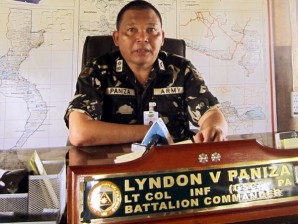13 soldiers face court martial for killing tribal leader’s wife, 2 sons

Army Lieutenant Colonel Lyndon Paniza. Photo from https://rudedolfo.blogspot.com
MANILA, Philippines – Thirteen Philippine soldiers will face court-martials for shooting dead the wife and two sons of a tribal leader who opposed a Swiss-Australian mining project, the military said Wednesday.
A military inquiry found the soldiers were negligent when they engaged in a shootout with the tribal leader because they did not try to avoid civilian casualties, said armed forces spokesman Lieutenant Colonel Lyndon Paniza.
“There is a violation of the rules of engagement. You should fire only aimed shots and determine your targets before you fire,” he told Agence France-Presse.
Paniza said a lieutenant and 12 enlisted men involved in the killings could face life in jail if found guilty.
In the incident on the southern island of Mindanao on October 18, soldiers shot dead the wife and two sons of Daguil Capion, a tribal leader opposed to the enormous Tampakan copper and gold project in his tribe’s area.
Article continues after this advertisementThe soldiers said they were fired upon as they neared a hut of the Capion family in an isolated part of Kiblawan town, prompting them to fire back, according to Paniza.
Article continues after this advertisementCapion escaped the scene, he said.
However a coalition of anti-mining activists, Alyansa Tigil Mina (Stop Mining Alliance), insists that it was a massacre with the soldiers opening fire on the hut without provocation, and that Capion was not there at the time.
The planned $5.9-billion mine project is run by Swiss mining giant Xstrata and Australia’s Indophil Resources NL.
The mine would be the country’s biggest source of foreign investment if it begins operations in 2016 as scheduled, although influential local church figures, tribal groups and environmental activists fiercely oppose it.
Spokesman for the mining project, Manalo Labor, declined to comment on the investigation but said the company did not condone violence.
Philippine security forces have long been accused of summary killings and other abuses.
President Benigno Aquino III, who took office in 2010, has said reforms undertaken by his government are improving the situation. However rights groups say much more needs to be done.